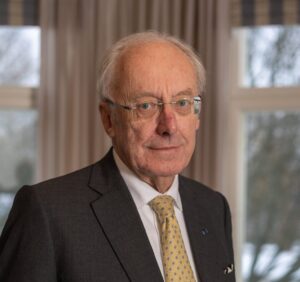Mika Laurilehto, acting CEO of Rauma Marine Constructions, presented RMC’s solutions for zero-emission shipping, in both the Baltic Sea and on a larger scale, to Finnish and Swedish industry representatives on 18 May 2022. Solutions based on cross-sector cooperation, local renewable fuels and an understanding of the geographical and business-related landscape, represent a few notable examples of RMC’s core competences.
Zero-emission shipping requires strong cooperation and full-scale utilisation of the latest environmentally friendly solutions from different maritime industries. The solutions must also take into account the year-round Nordic conditions of the Baltic Sea, in particular.
“The issue is not in fact only about shipping; the approach should be extended to entire logistics ecosystems. This includes combining sustainable shipping to carbon-neutral road transport, optimising logistics chains in terms of energy consumption, and using local renewable fuels,” says Mika Laurilehto, acting CEO of RMC.
Laurilehto spoke about the topic to Finnish and Swedish industry representatives at a Business Roundtable event on 18 May 2022, which was held in connection with the state visit to Sweden of Sauli Niinistö, President of the Republic of Finland. Laurilehto was part of the business delegation consisting of representatives from the maritime industry sector.
Local renewable fuels enable zero-emission transport chains
The goal for zero-emission maritime transport by the year 2050 was published at the COP26 Climate Conference in Glasgow, Scotland, in 2021. In addition, individual fossil-free-operated shipping routes, ‘green corridors’, were established as the near-future goal of the maritime transport industry.
According to Laurilehto, RMC’s idea of local renewable fuels are considered an optimal solution in terms of helping to implement the green transition, for example, along the shipping routes of the Baltic Sea. Fuels based on locally manufactured renewable energy do not require extensive transportation; in the best-case scenario, the ships can be fuelled in the direct vicinity of the production plant itself. This will lower the emissions throughout the entire value chain.
Finland has the opportunity to be the frontrunner in the green transition of maritime transport.
“When it comes to both fuels and ship-building skills, we strongly believe in self-sufficiency. Finland has the opportunity to be the frontrunner in the green transition of maritime transport. At RMC, we want to be part of building future solutions, but it is important to also look at the big picture. It is not enough to only have carbon-neutral maritime transport; the entire logistics chain from land to sea and back must be emissions-free,” states Laurilehto.
Year-round shipping must take into account the conditions of the Baltic Sea
The situation concerning shipping in Finland and Sweden is unique when compared to other countries, because the conditions in the Baltic Sea require the ships to operate even during winter. Both Finland and Sweden are planning to replace their current icebreakers due to the fact that the ships are approaching the end of their life cycle.
“The situation with the icebreakers is presently more acute in Sweden than in Finland. The icebreakers must also aim for zero emissions, which was not considered relevant when the now aging vessels were built. This will make the project more challenging, since the icebreakers require considerable power and energy to be able to open up a lane for increasingly larger merchant vessels,” Laurilehto explains.
The decision about the acquisition of icebreakers has not yet been made in either of the two countries, but Sweden has already initially inquired about RMC’s interest in the proposed project. Rauma already has extensive experience of arctic seafare, with the shipyard having built the multipurpose icebreakers Fennica, Nordica, and Botnica, which are still in use. Furthermore, RMC has also been responsible for the upkeep of other Finnish multipurpose icebreakers.
RMC is currently finishing the new car and passenger ferry MyStar for Tallink. The company is also working on four multipurpose corvettes for the Finnish Defence Forces and two next-generation RoPax car and passenger ferries for Tasmanian TT-Line.
Similar content




